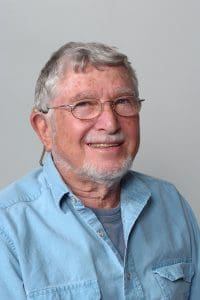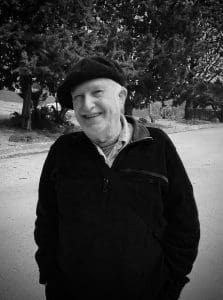 When the late former Dean Emeritus of the iSchool, Raymond Von Dran, arrived to take his position at the helm of the prestigious information school in 1995, Bob Benjamin was already teaching there. The two of them hit it off right away, but as Von Dran began to chart the course for the iSchool under his vision, he was stuck with this question: What the heck to do with a man like Bob?
When the late former Dean Emeritus of the iSchool, Raymond Von Dran, arrived to take his position at the helm of the prestigious information school in 1995, Bob Benjamin was already teaching there. The two of them hit it off right away, but as Von Dran began to chart the course for the iSchool under his vision, he was stuck with this question: What the heck to do with a man like Bob?
According to Benjamin’s widow, Kate Loring, here was a 68-year-old man that had two bachelor’s degrees but no PhD, a remarkable lifetime career in industry but not in academia, and was extremely likable in almost every way. Von Dran was laying the groundwork to grow the iSchool, and in order to do that, he needed to stack the ranks with qualified and seasoned faculty that performed as well on paper as they did in the classroom, but Benjamin was an excellent asset to the school and the dean wanted to find a way to better utilize everything he had to offer. The answer was as obvious and elegant as it was honorable to Benjamin, and valuable to future generations of iSchool educators.
They created a position that had Benjamin formally mentoring junior faculty and helping them to understand the culture that was being built at the school. His unique breadth of experience and depth of wisdom were being tapped into, and in return, the faculty had access to someone with all of those qualities – who was also genuinely interested in them and their quest to be great educators. Benjamin and Von Dran were both tremendously dedicated to building a culture at the iSchool revolving around collaboration, cross-disciplinary work, and producing well-trained and well-rounded graduates and leaders.
Von Dran often referred to Benjamin as his Jiminy Cricket, or Consigliere, because of the amount of reliable wisdom Benjamin could dispense for just about any occasion or vexation. Benjamin had spent his early years working for his family’s dress business in NYC, after earning his business degree from Wharton School at UPENN. He then decided to go a different route, and earning his engineering degree from Brooklyn Polytechnic, he set off into the burgeoning computer industry and the wilderness of corporate America. It was during the next few decades in industry – working for RCA, National Dairy Products, and finally for Xerox – that he developed his intense curiosity and passion for technology, information, and organizational change. And it was over the course of this second career that he honed his expertise in the space where those three things overlap.
Benjamin made his entrance into academia as an industry expert for a group convened to design curriculum for a brand new graduate-level program in Information Management. At the time, the group consisted of Benjamin – who was working as Manager of Strategic Planning at Xerox, a couple of other industry folks, and a large number of academics. After working with Benjamin for some time, the delegation from MIT asked him to join them back in Boston as a research fellow. Excited by the opportunity, but challenged by the logistics, he was able to negotiate an arrangement with Xerox that allowed him to travel from Rochester to MIT for 40 days a year; and just like that, Benjamin had a foot planted firmly in academia.
While working with Xerox and MIT, Benjamin helped author several research papers studying the dynamic interactions between information systems, technology, organizations, and people. A handful of those papers have proven to be immensely influential over the years since first being published. One in particular from the early ‘80s, which accurately predicted the rise of commerce between computers (or internet marketplaces), continues to rack up citations – now referenced in well over 5,000 other professional papers and studies worldwide. It was this collection of work that first garnered recognition for Benjamin as a true scholar, and put him on the radar of institutions like the iSchool.
Retirement from Xerox didn’t last long and Benjamin started a consulting business that focused on helping clients manage their technology systems and integrating new technologies into their changing organizational structures. Over time his attention, and his value to clients, shifted towards helping organizations manage massive technological changes more broadly. As this work was taking him farther from home on a more regular basis, and long after seeing his 60th birthday come and go, Benjamin was ready to consider the offer he was contacted about to join the iSchool faculty. Still living in Rochester, Benjamin reasoned that Syracuse was a lot closer than some of his far-flung consulting destinations, and teaching seemed like a fitting next step for someone who had spent so much time working with educators and thinking critically about scholarship.
It was an unconventional path to teaching, but gradually Benjamin worked his way up into a full-time professorship role with the iSchool. The title of ‘professor’ was often fraught, because technically he did not possess a terminal degree in any field or discipline. But despite the semantic debate over his title, and his initial symptoms of imposter-syndrome, Benjamin thrived in the professorship setting. According to Loring’s remarks at her husband’s celebration of life, she said, “in his autobiography he wrote, ‘I have had the fantasy for many years that I would reach Ericson’s stage of giving back what I know to another generation, and it seems somewhat miraculous that I am beginning to live it.’ He lived it both professionally and personally. One Syracuse colleague said, ‘Bob is the one who brings out the inner light—the best light—in all of us and helps us to grow together.’”
Loring and Benjamin met while working together at the university, and she sat in on a few of his classes during the early days of their courtship. “He was very good at juggling threads in a discussion and bringing things out of people,” she says. She describes how much time “Bob” would spend preparing and pulling material together for his classes. He was not the type to drone on in a lecture, rather his classes were all discussion-oriented and highly interactive. Because of Benjamin’s vast experience spanning many organizations and industries, his time as an educator in different capacities, and his years of personal therapy (which he all but bragged about), he was filled with knowledge, empathy, compassion, curiosity, and interest; and he had a genuine desire to help people around him, however possible, to move more gracefully through life.
Gisela Von Dran, widow to Raymond Von Dran and former professor and Director of the Master of Science in Library and Information Science Program at the iSchool, was both colleagues and close friends with Benjamin. At his services she credited Benjamin with delivering on his commitment to helping craft a forward-looking and resilient culture at the iSchool. After describing some of his accomplishments and legacies to information and technology studies, she said, “equally important, at least in my view, was Bob’s contribution in establishing a collaborative organizational academic culture by creating a “College of One”, an interdisciplinary organization without departments. Bob accomplished this by mentoring a large number of newly hired faculty members from different disciplines, master’s and Phd students, and administrators. They became highly creative, productive, and sought-after scholars and practitioners, and the Syracuse University School of Information Studies became highly ranked and emulated in this emerging field.”
 Benjamin’s teaching expertise was in the area of managing Information Technology-enabled change. This was the topic he had been exploring for the better part of his career in industry, and he had accumulated an abundance of knowledge by way of observation and research. Traveling to Syracuse to mentor, and using online platforms for teaching his graduate-level and executive education courses, he continued to serve the faculty and students of the iSchool even after he and Loring moved to Virginia Beach for her work. His energetic desire to share his own trove of information and to continue chasing down answers to questions was what motivated Benjamin to keep teaching and mentoring into his 80s.
Benjamin’s teaching expertise was in the area of managing Information Technology-enabled change. This was the topic he had been exploring for the better part of his career in industry, and he had accumulated an abundance of knowledge by way of observation and research. Traveling to Syracuse to mentor, and using online platforms for teaching his graduate-level and executive education courses, he continued to serve the faculty and students of the iSchool even after he and Loring moved to Virginia Beach for her work. His energetic desire to share his own trove of information and to continue chasing down answers to questions was what motivated Benjamin to keep teaching and mentoring into his 80s.
Bowing out of his final career, Benjamin retired from the iSchool at the age of 83, and with his windfall of freetime, he spent as much as he could with his family and grandchildren. In the time he gave, the iSchool was lucky to have him. As Loring said, “Thinking about my husband, the word “buoyant” comes to mind. One meaning is “cheerful and optimistic,” the core of the Bob we all love. But another definition is “capable of keeping a body afloat.” For the people he loved, for as long as he could, Bob did lift us up and help to keep us afloat when we needed him.” Surrounded by his family, Bob Benjamin died In June of 2022, at the age of 94.
Loring would like to see the Bob Benjamin Jr. Faculty Research Award kept afloat. This award was established as a tribute to his legacy in the IST field and his celebrated mentoring, and it is given to a junior faculty member that shows outstanding commitment and promise. Bob, still alive when Loring and Von Dran hatched the idea for this award, was ultimately flattered and delighted with the idea, and agreed that it conveyed the amount of care he had for the students and faculty he worked with. Loring’s hope is that anyone within Benjamin’s enormous sphere of influence will help keep the award funded and honored.
If interested in donating to the Robert Benjamin Jr. Faculty Research Award please visit the giving link, and follow these steps:
- indicate gift amount
- select “Choose another iSchool fund’
- scroll down and select “Other” and click ‘continue’
- then type “Robert Benjamin Faculty Research Award” in the ‘Selected Designations’ box
